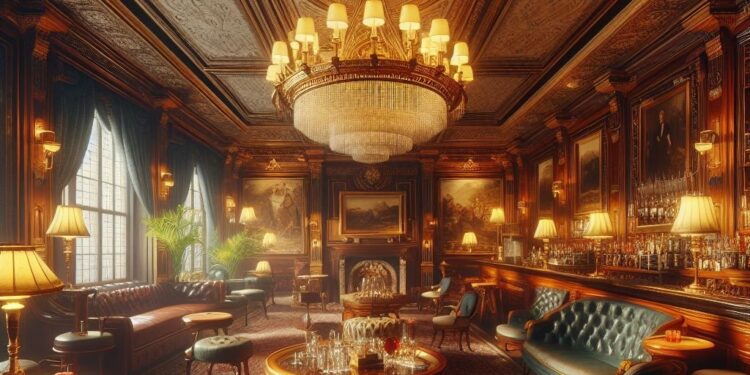In recent days, The Guardian has been on the warpath against the Garrick – one of the last remaining London gentlemen’s clubs that refuses to change its men-only membership policy. The newspaper’s coverage has already induced several prominent members to resign – though not before they tried to salvage their membership with the half-baked excuse that they wanted to reform the club from within.
This author can’t see anything wrong with the Garrick’s membership policy. In fact, it’s a positive good that men-only clubs exist. After all, the sexes are not indistinguishable and the dynamics of mixed-sex groups tend to differ from those of single-sex groups. Yes, it can be enjoyable to fraternise with men and women together. But it’s also pleasant to spend time in an all-male environment.
The Garrick’s critics, however, aren’t convinced. They make two main arguments against the club’s “antediluvian” membership policy (to quote former Garrick-member and aspiring gender activist Simon Case).
The first is that it’s unfair, unequal and downright non-inclusive for the club to bar women from membership. This is the weaker of the two arguments. Why? Well, if it’s “unfair” for the Garrick to bar women, then pretty much all single-sex associations have to go. That includes sports teams, lesbian bars and mosques (which are often segregated by sex). Some anti-Garrick campaigners might welcome this change, but many would not.
What’s more, even if the club did start admitting women, it’s membership policy would still be deeply “unfair”. Let’s be frank: 99.9% of the population are ineligible by virtue of being too poor and socially irrelevant. The quibble is over whether the female part of the remaining 0.1% should get to join. A move to allow women members would not be some grand victory for “equality” and “inclusiveness”, since the overwhelming majority of women (and men) would still be excluded.
Note that “0.1%” is surely generous on my part. The Garrick’s current roster has around 1,500 names – which amounts to just 0.002% of the population. And there’s apparently a ten year waiting list for new members. Whether a handful of high-powered women should get to join an ultra-exclusive dinner club is hardly the burning civil rights issue of our time.
The second anti-Garrick argument is slightly more compelling: women in professions like law and politics are disadvantaged with respect to their male peers, since they can’t mingle with senior judges and cabinet ministers in the Garrick’s hallowed halls. As the nominally Conservative MP Caroline Nokes opined, “It’s wrong in today’s society to have places that are still so pivotal to the establishment that exclude 51% of the population”.
There are several objections to this argument. In the words of one anonymous current member, the club is “very much not a networking venue”, with business meetings being specifically banned. While I’m sure the occasional favour gets exchanged across the dinner table, that’s explicitly not what the club is for.
Moreover, women aren’t actually barred from attending the Garrick but merely from becoming members. So the extent of their supposed disadvantage is rather limited (though they do have to be formally invited, which I suppose could be prohibitive for some).
Put all that to one side. There’s a stronger objection to the argument outlined above: The Guardian’s own reporting clearly demonstrates the club is not “pivotal” to any single profession let alone the entire establishment. Going by the numbers given here, Garrick members comprise: 8% of Supreme Court judges; 14% of Court of Appeal judges; 6% of High Court judges; 7% of KCs; and just 1.5% of MPs. The percentage of Lords who are members can’t be computed as the article simply refers to “dozens”. There are 792 Lords in total.
In other words, 86–94% of senior lawyers are not members and 98.5% of MPs are not members. To insist the fate of the nation is being decided at 15 Garrick Street is preposterous.
If membership were limited to senior male lawyers, say, and a large percentage of them were members, the argument that female lawyers are at a disadvantage might have some merit. But this plainly isn’t the case: the overwhelming majority of senior male lawyers are not members. Any professional advantage conferred by membership is enjoyed only by the few dozen men who happen to have been elected.
Now, you can claim it’s unfair that those specific men get to consort with one another at a swanky venue in Covent Garden, but that’s entirely different from claiming that women face a disadvantage compared to men. And then you’re just objecting to the fact of life that some people are more connected than others.
The Garrick isn’t some public body that is obligated to elect anyone who’s sufficiently “important” regardless of their personal characteristics. It’s a private members’ club whose purpose is to provide those members with merriment. And if maintaining the club’s long-standing traditions is what best achieves that purpose in the eyes of members, then it should keep on keeping on. The arguments against the Garrick don’t stack up.











To join in with the discussion please make a donation to The Daily Sceptic.
Profanity and abuse will be removed and may lead to a permanent ban.